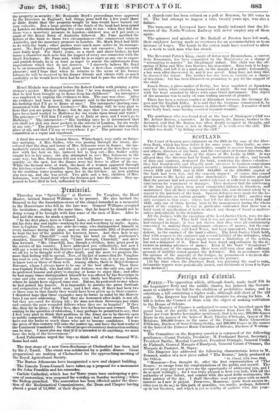SCOTLAND.
The Court of Session gave judgment on the 20th in the case of the Aber- deen Bank, which has been before it for some years. Miss Leslie, .as exe- cutrix of Mr. John Leslie, a shareholder, sought to recover from Davidson -and others, directors of the bank, and the executors of former d ' irectors the stun of 60001., as the value of the shares of Mr. Leslie in 1828. It was alleged that the directors had by fraud, malversatiou in office, and breath of duty and contract, destroyed the bank, rendering the shares valueless : they had fraudulently and illegally made advances to business connexions and private relations without proper security ; immense losses resulted be- tween 1828 and 1849, and in 1849 343,0001. of the 350,000/. capital of the bank had been lost, and the concern stopped : of course this caused great losses to Mr. Leslie and other shareholders. The defenders pleaded that the pursuer had not averred matter relevant or sufficient to support his conclusions for repayment or damages. They declared that the insolvency of the bank had arisen from great commercial failures in Aberdeen, and maintained that all their actings were optimA tide, and dictated solely by a. 'regard to the interests of the bank. Special defences were made for the in- dividual directors on various grounds. One had died in 1833 ; another was only assumed in that year ; others had left the direction between 1843 and 1849, only one of them having been hi the niunagemeut during the whole period of the contract. It was in particular contended that there was a. total want of specification of facts to attach any charge of fraud or maker- satiou individually to the defenders. All the Judges, with the exception of the Lord Justice Clerk, were for dis- missing the action. They held- that it was not proved that the defenders had engaged in fraud ; it was not shown that they were all continuously concerned in making these unfortunate advances Of money, but the con- trary. The directors, said Lord Wood, had been imprudent, but not frau- dulent, in the conduct of the bank's affairs. The Lord Justice Clerk held, that with respect to the conjunct and several liability of the defenders, what had been urged in their favour might warrant a limitation of the action, but-not a dismissal. of it. There had been fraudang collusion by the di- rectors in making advances of money. Even if the word " fraudulent" were struck out of the summons, tkere were still very clear and sufficient grounds of liability stated against the defenders. But in accordance with the opinion of the majority of the Judges, he pronounced a decision dis- missing the action, throwing the expenses on the pursuer.
[At the time when the Aberdeen. Bank was pursuing the road to ruin, favourable reports were periodically issued, and dividends of from 6 to 9 per cent declared.]


























 Previous page
Previous page